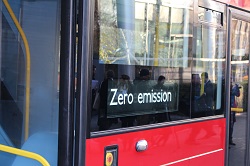Greener public transportation underway in Germany and the UK
A total of 62 hydrogen-powered buses are to be introduced into the public transportation systems of British cities Aberdeen and Dundee and Germany’s Cologne and Wuppertal. This venture is part of two projects, JIVE and JIVE 2, which have received EUR 57 million in funding from the EU. The projects aim to promote hydrogen fuel cell (FC) buses as a commercially viable means of zero-emission public transportation. Forty FC modules purchased for buses in Germany Canadian FC manufacturer Ballard Power Systems has recently received an order for 40 FC modules to power buses under the JIVE projects. The FCveloCity-HD 85 kW modules are intended for buses to be deployed in the 2 German cities. Cologne, which has already introduced FC bus technology to its transport system, will be gaining 30 buses. First-timer Wuppertal will be receiving 10. Delivery of the buses is expected to begin in 2019. “This is the largest order ever for fuel cell buses in Europe and will be the first deployments under the JIVE I programme,” Rob Campbell, Chief Commercial Officer of Ballard, reports in a news item posted on the gasworld(opens in new window) site. “Transit buses are an excellent example of a strong fit for fuel cell technology, which is able to meet the key requirements of long range, rapid refuelling, heavy payload and full route flexibility. We are excited to see the growing interest in Europe for the use of our zero-emission power products.” Twenty-two FC buses for the UK JIVE’s two Scottish participants will be deploying 22 FC buses in their cities. Twelve of the buses will be used in Dundee. The vehicles are part of the city’s plan to create a state-of-the-art integrated energy park with hydrogen FC buses, fleet vehicles, and refuelling infrastructure that uses hydrogen and alternative fuels. The second Scottish recipient, Aberdeen, has one of the most advanced municipal hydrogen-powered fleets in the UK. It already owns 10 buses, 14 cars (including a taxi), 4 vans, and a dual-fuel street sweeper that runs on both diesel and hydrogen fuel. The new addition of 10 FC buses will double its existing bus fleet. Together, the 2 JIVE programmes intend to supply close to 300 new zero-emission FC buses and the refuelling stations needed to 22 European cities by 2023. Now in its second year, JIVE is focusing on five countries – Denmark, Germany, Italy, Latvia and the UK – as the recipients of the 139 FC buses it aims to deploy. Adding to this momentum, the newly begun JIVE 2 plans to supply another 152 FC buses across 14 European cities throughout France, Germany, Iceland, Norway, Sweden, the Netherlands and the UK. Overall, the two JIVE (Joint Initiative for hydrogen Vehicles across Europe) projects are striving to advance the commercialisation of FC buses through large-scale deployment of vehicles and infrastructure. Their aim is to make it possible for bus operators to include hydrogen-powered buses in their fleets without having to be subsidised. Furthermore, they hope to empower local and national governments to regulate for zero-emission propulsion for their public transport systems. For more information, please see: Project web page(opens in new window)
Countries
United Kingdom



